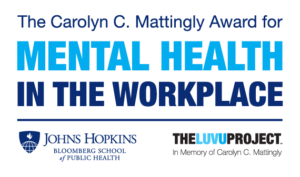Metro Nashville Public Schools (MNPS) was recently named a recipient of the Carolyn C. Mattingly Award for Mental Health in the Workplace. The award celebrates organizations that prioritize the mental health and well-being of their workforce, often using innovative strategies that can serve as inspiration to other employers.
MNPS has bolstered its multifaceted approach to employee wellbeing in recent years, offering mental health resources through a variety of channels, including in-person programs at their Employee Wellness Centers, as well as virtual visits and app-based programs. This approach has given all employees and their dependents access mental health benefits with no co-pays.
Removing Barriers
MNPS employees and their families can access a variety of health care services, including mental and behavioral health support, at five Employee Wellness Centers, all staffed by Vanderbilt Health providers. Vanderbilt Health offers programs across the continuum of mental wellness, supporting everyone from those with acute mental health concerns to those who need a little extra support to thrive. These mental health benefits are designed to appeal to different cultures and backgrounds, using a variety of communication methods to improve access and reduce stigma.
“MNPS has been very intentional about removing barriers to care such as access, cost and stigma,” says Martha E. Shepherd, DO, MPH, FAAFP, Assistant Professor of Clinical Medicine and Pediatrics, VUMC Office of Population Health. “MNPS has responded directly to employee surveys by customizing their health benefits and improving access to care. Having onsite medical clinics with providers who are familiar with MNPS benefits and how to access them has been key to successfully supporting employees and their family members, particularly during the COVID-19 pandemic.”
Data-Driven Benefits Design
Vanderbilt Health assists MNPS with workforce surveys, gathering data from first year teachers, teachers of the year and patient advisory groups. The data has shown that younger teachers often score lower in mental health and wellbeing measures, and they have higher turnover rates compared to senior teachers.
Based on the survey results, MNPS redesigned parts of their health plan to improve mental health care benefits, such as offering after-hours access to therapists in convenient locations, virtual appointments and app-based resources that support employees’ mental health.
MNPS also removed all behavioral health co-pays for providers in-network with Cigna while continuing to offer unlimited Employee Assistance Program (EAP) visits for employees and their dependents. At the same time, MNPS and Vanderbilt Health partnered with a local behavioral health company for program development and an app-based telehealth program, nearly tripling the number of available, in-network behavioral health providers for employees and their families.
Another signature offering at the MNPS onsite clinic is an 8-week Mindfulness-based Stress Reduction (MBSR) Course. Research shows that MBSR is particularly helpful to health care providers, first responders and educators—people who encounter daily stress and want to find a healthier way to live with it. Educators who complete the course develop healthier habits and build stress-reduction skills for both the classroom and their personal lives.
Following these changes, nearly 9 in 10 participants in a 2022 employee survey agreed that the available mental health benefits were helpful to them and their families.
Mental and behavioral health challenges affect nearly 1 in 5 adults in the United States. Given how much time adults spend at work, it is vital to promote good mental health care in the workplace. By supporting a healthy workforce both physically and mentally, employers can improve productivity, retain staff, increase attendance and produce long-term cost savings while attracting new talent.
